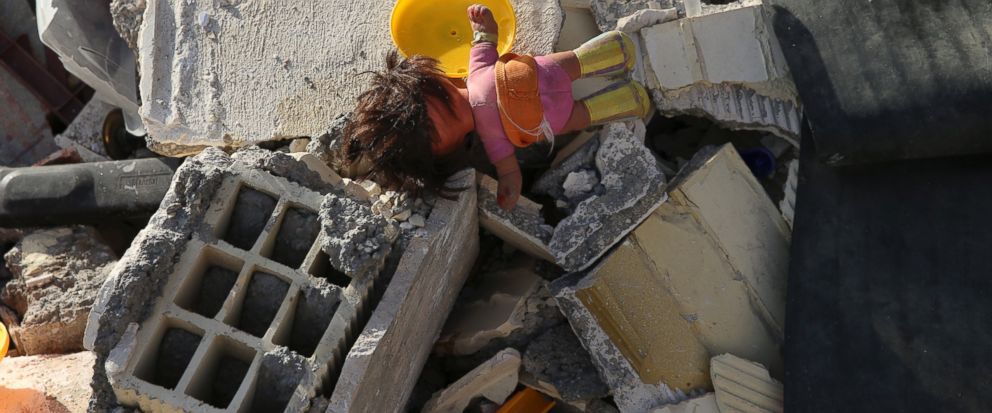Criticism of US sanctions returns in Iran after earthquake
WATCH Earthquake leaves western Iranian town in ruins
Interested in Iran?
Add Iran as an interest to stay up to date on the latest Iran news, video, and analysis from ABC News. Iran Add Interest
With Iranian-Americans abroad unable to send money directly to Iran to aid those affected by this week's powerful earthquake that killed over 530 people, criticism of U.S. sanctions on Iran flared up anew on Thursday.
The 2015 nuclear deal Tehran struck with world powers lifted some sanctions but others, dating back as far as the days after the 1979 U.S. Embassy takeover, still stand, including those that prohibit about 1 million Iranian-Americans from directly sending cash to Iran.
The state-run IRNA news agency, as well as other media, published articles criticizing the rules.
"Despite all the difficulties, Iranians living in the U.S. are doing their best to devise innovative solutions to send their humanitarian supplies to the quake-hit areas in western Iran," IRNA's report said.
Iran's Foreign Minister Mohammad Javad Zarif said earlier this week that his country does not need foreign help for the quake and it is capable of managing the aftermath on its own.
President Donald Trump has not commented on the earthquake so far. He has refused to re-certify the Iran nuclear deal, sending it Congress instead, and has accused Iran of arming Shiite rebels in Yemen with ballistic missiles to attack Saud Arabia.
The U.S. Treasury has lifted some sanctions in the past to help with Iranian earthquake relief, most notably in 2003 under the administration of President George W. Bush when a magnitude 6.6 earthquake killed 26,000 people in Bam. That was even after Bush named Iran a member of the "axis of evil."
In a statement to The Associated Press, the Treasury called the earthquake "tragic" and said it allows donations of food, clothing and medicine to previously approved American organizations, which then send them on to Iran. Those organizations also can send up to $500,000 a year in cash, the Treasury said.
However, the Treasury did not respond to questions whether it would lift sanctions as in 2003.
Without that, banks and other organizations will remain fearful of running afoul of U.S. laws, which "tend to be fuzzy, and the fines … seem to be astronomical," said Trita Parsi, the founder and president of the National Iranian American Council.
A bank once told "us the best way to send money to Iran is to fill a suitcase with cash and fly to Tehran," Parsi told the AP. "The banks make money from these transactions. When they say no to a transaction, they are just terrified."
Parsi said that trickles down to online crowdfunding websites. He said his organization received several complaints about online fundraisers for Iran being shut down and money being returned to donors.
Sunday night's earthquake hit about 31 kilometers (19 miles) outside the eastern Iraqi city of Halabja, according to the U.S. Geological Survey, and struck 14.4 miles (23.2 kilometers) below the surface, a somewhat shallow depth that can amplify the damage. Iran's seismologic center has said the quake struck on Iranian soil.
The official IRNA news agency has said that 530 were killed while state TV put the number at 432. At least 100 people are believed to have been buried by families in rural villages without going to authorities for death certificates, which may explain the discrepancy. Over 9,300 people were injured.
In Iraq, nine people were killed and 550 were injured, all in the country's northern Kurdish region, according to the United Nations.
Iranian doctors and nurses continued to offer aid Thursday to those affected.
In Kermanshah, the province hardest hit by the quake, the Taleghani Hospital in its capital remained full of injured, their gurneys filling rooms and hallways as they received medical care.
"I was home at the time of earthquake. It was horrifying," survivor Amir Mohammad said as he sat on a gurney, his head bandaged. "Everybody started to flee when the house collapsed and lights went out. I got stuck under debris."
A short distance away, in the town of Eslamabad, the gates of the recently opened Imam Khomeini Hospital were shut. The hospital sustained tremendous damage during the quake, with parts of its ceilings and walls toppled.
Dr. Ahmad Reza Biglari, the hospital's chief, watched as workers tried to clean up the debris at the empty clinic. Cracks ran through rainbow-painted lines on its walls.
"Usually when a problem occurs in a town, people of the town rush to its hospital," the doctor said. "Our hospital has been damaged before any other residential building in the town."
The damage there, as well as at other state-constructed housing projects, prompted criticism after the quake.
More than 400 aftershocks have struck the region, making many afraid to even go inside their homes to salvage whatever belongings they can. Some sleep outside in tents or fashion whatever shelter they can out of reeds.
The delivery of aid by the government has also been criticized, with officials blaming it on public order breaking down when deliveries arrived. Officials alleged families that were not affected by the quake rushed and took some of the aid supplies.
Many ordinary Iranians banded together to supply blankets, water and other necessities.
"I do not really know how to thank people of Iran," said Javad Mansouri, who survived the earthquake in the hard-hit town of Sarpol-e-Zahab. "Seeing the amount of these donations brings tears to my eyes. They are really helping us."
———
Karimi reported from Tehran, Iran. Associated Press writer Jon Gambrell in Dubai, United Arab Emirates, contributed to this report.
- Star
Add Interests Customize your news feed by choosing the topics that interest you.
To save your interests across all devices Log In or Sign Up »Source – abcnews.go.com

